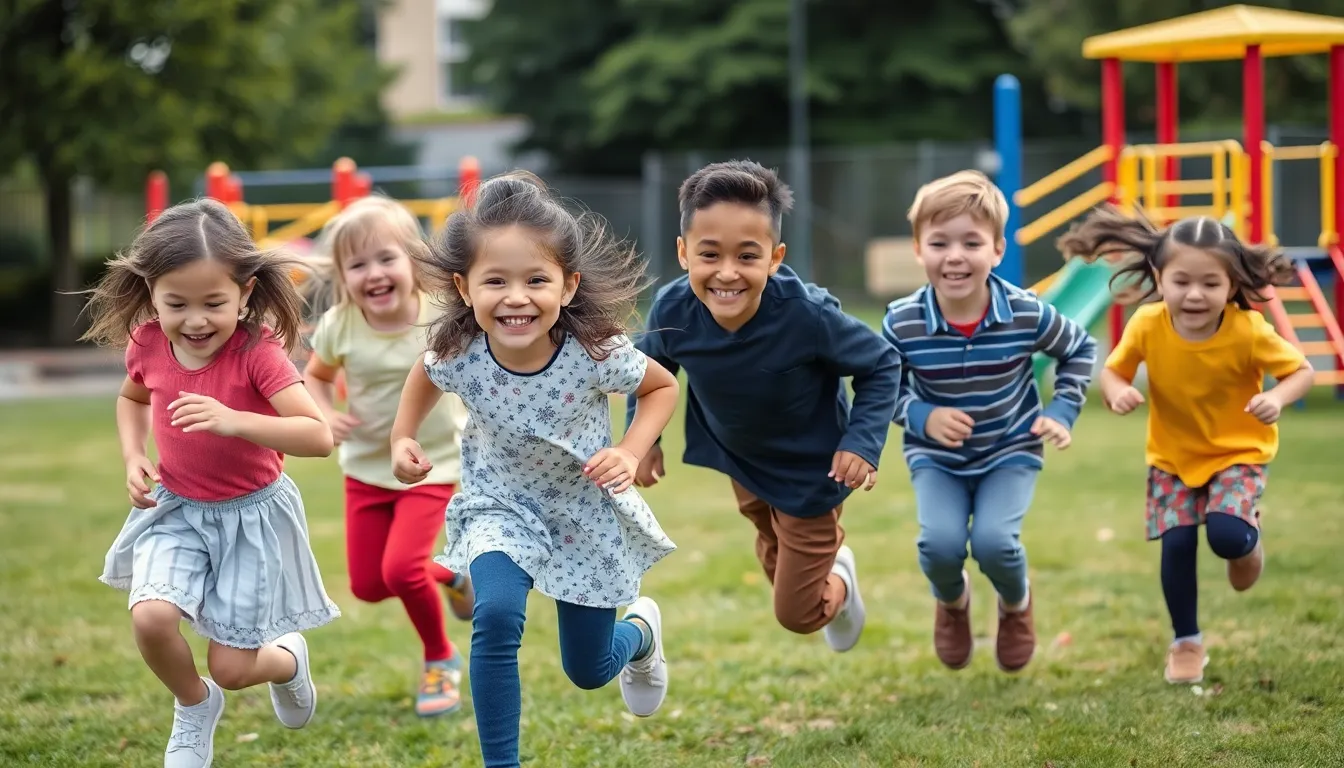Table of Contents
ToggleIn today’s fast-paced world, ensuring preschoolers engage in regular physical activity is more important than ever. Early childhood is a crucial time for developing healthy habits that can last a lifetime. Preschool fitness not only promotes physical well-being but also enhances cognitive development and social skills.
By incorporating fun and interactive activities, parents and educators can foster a love for movement in young children. From playful games to structured exercises, preschool fitness programs aim to keep kids active while encouraging teamwork and creativity. As awareness of childhood obesity rises, prioritizing fitness in preschool settings becomes essential for nurturing healthy, happy kids.
Overview of Preschool Fitness
Preschool fitness focuses on promoting physical activity among children aged 3 to 5 years. This stage of development is crucial for establishing lifelong healthy habits. Engaging in regular physical activity enhances physical health, cognitive abilities, and social interactions.
Key Components of Preschool Fitness
- Physical Activities: Incorporating activities like running, jumping, and dancing fosters motor skills and boosts energy levels. Structured play sessions encourage children to explore different movements.
- Fun Games: Using playful games fosters a love for physical activity. Activities such as tag, obstacle courses, and bean bag tosses keep preschoolers actively engaged while developing coordination.
- Social Interaction: Participating in group activities promotes teamwork and communication skills. Children learn to share, take turns, and work together, building social connections.
- Cognitive Development: Physical activity supports cognitive growth. Activities that involve counting steps or following directions enhance problem-solving skills and focus.
- Health Education: Introducing concepts of nutrition and fitness helps children understand the importance of a healthy lifestyle. Simple discussions about balanced diets encourage them to make better food choices.
Benefits of Preschool Fitness
- Improved Physical Health: Regular activity helps prevent childhood obesity and develops strong bones and muscles.
- Enhanced Cognitive Skills: Movement enhances brain function and improves attention span.
- Social Skills Development: Physical activities build relationships and help children develop empathy and cooperation skills.
Prioritizing preschool fitness equips children with crucial habits that promote their overall well-being. By creating a fun and interactive environment, educators and parents foster a positive attitude towards physical activity in early childhood.
Importance of Physical Activity in Early Childhood

Physical activity plays a crucial role in early childhood, shaping overall quality of life. Engaging preschoolers in regular movement fosters essential developmental milestones.
Benefits for Physical Development
Physical activity promotes the growth of strong muscles and bones in preschoolers. It enhances coordination and balance through activities like running, jumping, and playing with balls. Regular exercise helps maintain a healthy weight, reducing the risk of childhood obesity. Active preschoolers often display increased energy levels, which positively affects their willingness to participate in various activities. Moreover, engaging in structured play improves gross and fine motor skills, laying the foundation for future athletic pursuits.
Benefits for Cognitive Development
Physical activity contributes significantly to cognitive enhancement during early childhood. It increases blood flow to the brain, which can improve memory and learning capabilities. Activities that require problem-solving, such as obstacle courses, promote critical thinking skills. Additionally, engaging in team games fosters cooperation and communication, essential skills for collaborative learning. Research indicates that physically active children tend to exhibit better focus and attention in educational settings, facilitating academic success. Preschool fitness activities can stimulate creativity and imagination, further enriching cognitive growth.
Types of Preschool Fitness Activities
Various preschool fitness activities engage young children in ways that promote physical health while making movement enjoyable. These activities fall into three main categories: structured play, unstructured play, and movement-based learning.
Structured Play
Structured play involves organized activities with clear rules and objectives. Activities such as obstacle courses, relay races, and guided group games enhance coordination, strength, and teamwork. Coaches or educators can facilitate these play sessions, providing appropriate supervision while ensuring safety. For example, an obstacle course designed for preschoolers may include simple tasks like crawling under tunnels, jumping over low hurdles, or balancing on a beam, all tailored to improve gross motor skills.
Unstructured Play
Unstructured play offers children the freedom to explore physical activity in a spontaneous manner. This type of play encourages creativity and imagination while still facilitating movement. Activities such as climbing on playground equipment, running freely in an open space, or engaging in tag games allow children to develop their physical abilities in a relaxed environment. Unstructured play promotes social interactions among peers, fostering communication and cooperation as children engage in shared activities.
Movement-Based Learning
Movement-based learning integrates physical activity with educational concepts, making learning dynamic and interactive. Activities such as dance, yoga, and action-based storytelling enhance physical fitness while reinforcing language, math, and science skills. For instance, a dance routine might incorporate counting or patterns, allowing preschoolers to learn while enjoying movement. These activities stimulate both the body and mind, supporting cognitive development and reinforcing the notion that learning can be an active process.
Role of Educators and Parents
Educators and parents play a pivotal role in promoting fitness among preschool children. Their involvement shapes attitudes towards physical activity and helps create a foundation for lifelong healthy habits.
Encouraging Active Play
Encouraging active play is essential in developing children’s physical skills. Educators and parents can facilitate this by providing a variety of physically engaging activities. They can organize games that emphasize movement, such as tag, hopscotch, or dancing. They can also join in on the fun, demonstrating enthusiasm and motivating children to participate. Interacting with children during play enhances social skills and nurtures a sense of community. By praising effort and participation, educators and parents reinforce positive behaviors related to physical activity.
Creating a Fitness-Friendly Environment
Creating a fitness-friendly environment supports regular physical activity among preschoolers. Safe, accessible outdoor and indoor spaces facilitate movement and exploration. Educators and parents can establish dedicated areas for active play equipped with age-appropriate equipment, such as small slides or climbing structures. They can also incorporate fitness activities into daily routines, such as stretching before storytime or brief active breaks during lessons. By modeling an active lifestyle, they impart the importance of fitness and encourage children to embrace movement as a natural part of their day.
Challenges in Promoting Preschool Fitness
Promoting fitness among preschoolers involves navigating various challenges. Addressing these barriers is essential for fostering an environment where young children can thrive physically.
Common Barriers
- Sedentary Lifestyles
Sedentary lifestyles hinder children’s opportunities for active play. Screen time often replaces physical activities, limiting engagement in movement-based exercises.
- Limited Resources
Limited access to parks, playgrounds, or sports equipment restricts opportunities for structured and unstructured play. An absence of suitable environments diminishes children’s motivation to be active.
- Time Constraints
Busy schedules pose challenges for parents and educators. Limited time for physical activities reduces consistent engagement in fitness-focused routines.
- Lack of Awareness
Parents and educators sometimes lack understanding of the importance of physical activity. Without knowledge of how to effectively incorporate fitness into daily routines, nurturing healthy habits becomes difficult.
- Resistance to Change
Established routines may create resistance to incorporating new fitness activities. Children often prefer familiarity, making the introduction of new games and exercises challenging.
Solutions and Strategies
- Encourage Active Play
Encourage daily active play by scheduling time for physical activities. Simple playtime interactions, such as games and outdoor exploration, promote natural engagement.
- Create Accessible Spaces
Create accessible play environments by ensuring safe outdoor and indoor spaces. Incorporating fitness equipment, such as balls and climbing structures, encourages active participation.
- Implement Structured Activities
Implement structured activities in preschool settings. Organize fun fitness events, like dance parties or obstacle courses, which enhance coordination and foster social interactions.
- Educate Parents and Caregivers
Provide educational resources for parents and caregivers. Workshops or informational sessions help them understand the impact of physical activity on child development.
- Promote Family Involvement
Promote family involvement in fitness activities. Organizing community fitness events or family exercise days strengthens relationships and creates shared commitments to active lifestyles.
- Utilize Technology Moderately
Utilize technology moderately while encouraging physical activity. Balance screen time with active play by incorporating educational apps or video workouts that engage children in movement.
By recognizing and addressing these challenges, educators and parents can create a supportive environment that promotes fitness for preschoolers, laying the groundwork for lifelong healthy habits.
Fostering a culture of fitness in preschool settings is vital for children’s overall development. By integrating physical activity into their daily routines, educators and parents can nurture not only physical health but also cognitive and social skills. The benefits of active play extend beyond mere enjoyment; they lay the groundwork for lifelong healthy habits.
Creating an engaging and supportive environment encourages children to embrace movement and develop a positive attitude toward fitness. As challenges arise, proactive strategies can help overcome barriers, ensuring that preschoolers remain active and engaged. Prioritizing fitness in early childhood ultimately shapes healthier futures for children, equipping them with the skills they need to thrive.




